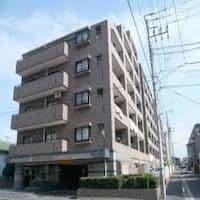 image: reins Japan
image: reins Japan
The Best of All Worlds
Small unit blocks are an excellent and balanced combination of both good rental returns AND capital appreciation potential, and are usually the asset class of choice for investors who can afford them. They offer both flexibility and creativity of use, which individual units in co-owned blocks do not but also stand to gain more in value if and when prices go up, as the landlord owns the entire land parcel on which they are built.
The sweet spot, as far as most investors are concerned, lies in two or three story buildings with 4-18 units. These tend to be more affordable, and also cheaper to maintain, as they do not require an elevator - which tends to add a large annual upkeep factor. Elevators are only legally required from 6 floors and upwards in Japan - but units on the 4th and 5th floor of buildings without elevators tend to be harder to populate when vacant, as most elderly tenants, as well as single mothers, will usually avoid those due to the hard climb involved.
Flexibility & Creativity - The Long-Term View
These buildings would normally be wood or steel frame based, and so would have a much shorter life expectancy than their reinforced concrete monster "big brothers", and would require more regular maintenance and repair - but are also far easier to demolish and dispose of when the time comes to re build.
This makes things far easier and cheaper as far as creative freedoms are concerned, since owners can renovate and re-purpose these structures into guest houses, share houses - or even completely destroy them and re utilise the land for other purposes, such as building a house, a warehouse/logistics facility, or even a parking lot.
Lastly, owning the entire structure opens up far more possibilities as far as creative leasing goes - options which would not normally be available to owners of individual units in co owned buildings, who must comply with building management rules and regulations - which are usually far more restrictive.
Befu, Fukuoka - 6-unit Residential Building - 45 mil JPY (app. 400,000 USD)
Fukuoka city, one of Japan's most popular investment destinations, is home to several attractive and recently rejuvenated city centres and hot-spots – one of the most popular ones being Ropponmatsu, where a newly built court-house, adjoining office buildings and residential developments, have sent property prices and demand soaring since 2016. As is usually the case, the next suburb down the train or subway line would normally be the next immediate beneficiary from these projects, and would be the best possible place to buy – simply because prices may not have gone up as of yet, or at least not as sharply as its popular neighbouring suburb has – but are all but guaranteed to do so within a few years.
Befu, which is the next suburb and corresponding station on the subway line heading out of the city center, is that suburb centre, is that suburb ––and so it was still possible to purchase the ten year old, 6-unit residential building pictured above, as late as December 2018, for only45 million Japanese Yen (approximately 400,000 USD).
Located only a few minutes walk from Befu subway station, with spacious and modern studio units, full of light equipped with high ceilings, laundry machine pans with taps, drainage, etc –AND loft bedrooms(!), the building has been operating at full occupancy at the time of purchase, and indeed throughout the past decade, since its construction.
The seller has taken care to install a high-speed internet network, with unlimited download capabilities, provided to all tenants and included in their monthly rental payment. This, along with the location and modern interiors and exterior of the building itself, have served to attract a relatively affluent tenant population, mainly professional singles in their late twenties or early thirties, who appreciate this type of accommodation, and are happy to pay the price for it.

The Numbers
With all purchase and regular running costs ––cleaning, gardening, insurance and internet services included - the total rental return for this property has been clocked at approximately 5.5% net pre-tax at the time of purchase - which, while not the best that can be had in the city, is remarkable for a property this young and in this location.
The added value of owning a 120 square meter plot of land in the centre of the city, in a suburb which is quite likely to gain significantly in value should the the economy continue to fare well, is self-evident. The property is also within short walking distance to a university campus, several schools, the local ward/city hall and a hospital.Disadvantages
Disadvantages
So, with all of the above, what are the actual disadvantages of this seemingly perfect property?
- As mentioned above, owning the entire structure, and the lack of monthly building fees which are meant to cover all structural expenses, mean more prominent uncertainty and risk factors. The building is very young, so it is highly unlikely that any big ticket items will require attending to in the next decade or two – but as the years pile on, these wooden and steel-framed structures do require ever-increasing maintenance, renovation and partial re-builds.
- The added benefit of potential capital appreciation is only as good as the national and regional economies are. Should these continue on track, the owner stands to win on all fronts – but should tail-winds restrict further growth, the slightly lower rental income compared with individual units, and added structural expenses, can all put a damper on profitability.
Deal Analysis & Summary
Generally speaking, buildings tend to make excellent investments for buyers who have capital expenditure flexibility - meaning, those who can afford to put aside the safety buffers required for sudden maintenance, renovations and repairs, which are on a higher scale than those normally required for individual units – and are also confident enough that they will be able to accumulate substantial savings over the course of a decade or two, if and when the time comes to re-build, or demolish and build, or demolish and dispose of the existing structure in lieu of a new project to be planned and built on the same land plot.
In this particular case, the buyer, a professional investor from the USA, fits the profile perfectly, and has been aiming towards this exact type of investment from the get-go.
The dis-advantages inherent in this type of property, therefore, have been considered and accounted for, and it was only a matter of researching, sourcing and conducting due diligence on a property which would tick all of the boxes mentioned above ––which was exactly what this particular building has done for his portfolio. And, while this property was his first purchase in Japan, his pre-existing assets in other countries also provide him with the diversity and hedging required to make this type of slightly higher-risk investment worth his while.
What are your thoughts on this property deal? Would you like to see more of the same? Are there other types of properties that you'd like us to analyse in this series? Would love to read your comments and/or questions in the comments section below!
(Are you interested in Japan's real-estate property market? Maybe you have been watching from the sidelines for some time now, but aren't sure how to make your first move? Perhaps you're concerned about language and cultural barriers? Please feel to reach out - I'm always happy to talk shop, and will gladly answer all questions, free of any charge or commitment. Please do not hesitate to contact me directly with any topic, question or comment)








